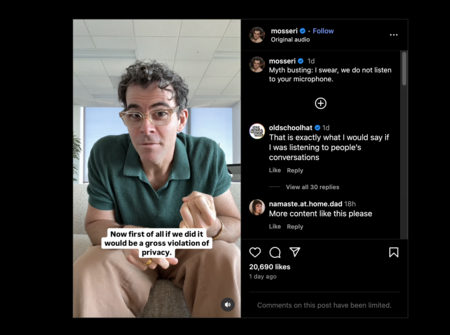In a meeting between friends you talk about making a weekend getaway, rural houses and whether it is worth renting a car. Hours later, when Instagram opens, ads appear for travel agencies, car rental portals and route recommendations. The feeling that The mobile “hears us” It is installed easily. In this context, Adam Mosseri, head of Instagram, published a video to disassemble that myth and explain why we see ads that seem to guess our conversations.
Meta has almost a decade denying sharply that their applications access the microphone without permission, but doubts never disappear at all. Now the discussion returns to the front line because the company has announced that, as of December, conversations with its artificial intelligence assistant will also be part of the customization of ads and recommendations (this change will not be applied, at least for now, in the European Union). The denial and this novelty have communicated almost at the same time, which adds a striking nuance to the message.
Mosseri says they don’t listen to us, while finishing another key novelty
The closeness between both communications did not go unnoticed. Instagram head chosen a personal tone, even light, but at the same time he wanted cut the suspicion that the application listens to its users. He presented that statement as a starting point on which to build his explanation. His words were clear and it is worth reproducing them in full:
“We do not listen to you. We do not use the microphone of the phone to spy on. If we did, it would be a serious violation of privacy. In addition, we would exhaust the battery of the device and noticed it, and you would even see a small light in the upper part of the screen that would tell you that the microphone is on.”
For Mosseri, what seems to really be the effect of four quite common situations. One possibility is that before talking about a topic and lor we have sought without remembering it. Another is that someone in our environment has done it and the platform takes it as a indication. It can also happen that the announcement has appeared before and we did not pay attention, but that it later sneaks into the conversation. And the simplest explanation of all remains: it is a mere coincidence.
“I want to reiterate that we do not listen to your microphone. I know that some of you are not going to believe me no matter how much I try to explain, but I wanted to make things clear. I am sure that the comments in this publication will be a bit intense. We see you soon. Paz.”
It was not the first time that the company was trying to settle the suspicion. In 2016, Facebook said that he did not use the phone’s microphone to guide ads or to change what appears in the feed. Two years later, in an appearance before the United States Senate, Mark Zuckerberg was asked directly about the subject and rSponge With a “no” just as sharp. Years later, the Meta support website included a document in the same line.

Click to watch the video on Instagram
Doubts about possible listening also led the academic community to test it. In 2017, a group of researchers from Northeastern University analyzed more than 17,000 Android applications, including those of Facebook, to check if they activated the microphone without the user knowing. After months of evidence, they found no evidence that it happened. They did observe other data collection behaviors, but do not listen undercover. The authors themselves clarified, yes, that there were scenarios that were left out of their study.


Beyond the studies, there is a technical aspect that should be remembered. In current mobiles, both in iOS and Android, any application that wants to use the microphone You need explicit user permission. In addition, when an actor appears active on the screen (a color point or a warning in the upper bar) that immediately points it. These notices, together with the extra battery consumption that would involve permanent listening, make it difficult to hide an undercover use of the microphone without the user noticed.

The persistence of this myth is better understood if the context is observed. The directed advertising is so precise and so difficult to decipher for the average user that it is easier to attribute it to a microphone on than to an invisible data network. Our memory also influences. To this is added the history of mattress controversies in matters of privacy.
Images | Brett Jordan | WorldOfSoftware with Gemini 2.5 | Screen capture
In WorldOfSoftware | I’ve been hooked to Sora 2 for two days: I’m generating absurd memes where I am the protagonist and I can’t stop







-xl.jpg)



